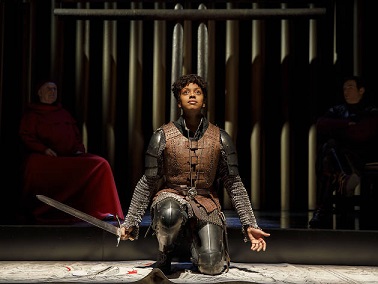 Most of us have at least a working familiarity with the story of Joan of Arc. A simple (but not impoverished) French peasant girl, she began hearing voices from God telling her she was going to save France from the English and their Burgundian allies. Through some combination of cleverness, sincerity, and miraculous signs, she convinced Charles VII to let her lead French soldiers in battle and eventually secured his coronation.
Most of us have at least a working familiarity with the story of Joan of Arc. A simple (but not impoverished) French peasant girl, she began hearing voices from God telling her she was going to save France from the English and their Burgundian allies. Through some combination of cleverness, sincerity, and miraculous signs, she convinced Charles VII to let her lead French soldiers in battle and eventually secured his coronation.
Having outlived her political usefulness, Joan was then pushed aside. She was captured by the English, put on trial for heresy, and burned at the stake when she was only nineteen years old. In her final moments, she begged for a cross to be held before her, high enough to see through the flames. She called out to Jesus while she burned.
It’s a gripping tale, and surprisingly well-documented for its times. References to Joan pop up everywhere in the historical record, as do endless legends, rumors, and interpretations of her life and death. By far the most detailed accounts were the trial records so carefully preserved, first by those who wished to condemn her, then several decades later by those who wished her redeemed. For five months, Joan was questioned, criticized, badgered, and abused by learned men with little interest in legal or spiritual truth. Their goal was to destroy her reputation, to invalidate her apparent miracles and the king she claimed to have installed by the will of God. If she could be shown to be a heretic – a witch – then the English could reclaim the political and spiritual high ground and eventually control France itself.
The courtroom in which Joan was tried and convicted was not a traditional English court of law. Nor was it properly sanctioned by the Catholic Church then recognized as the authority over such issues. It was instead something of a rogue proceeding, heavy with the trappings of a religious investigation but failing to adhere to the rules of either Church or State. Joan, a peasant girl with no formal education, was denied her own counsel. She was kept in what was essentially a dungeon rather than a church prison as required in such cases. At one point, Joan apparently signed a confession of sorts, under fear of the most painful of deaths. It’s unlikely she knew precisely what it said, and she recanted soon after, at which point her fate was sealed beyond redemption. She was executed by fire.
And yet, reading through the trial records, it becomes clear that Bishop Cauchon – the primary interrogator and the man most accountable to the English for securing Joan’s condemnation – is repeatedly frustrated in his efforts to pin heresy or witchcraft on Joan in any meaningful way, even in these severely tilted circumstances. It’s equally clear that it was essential to the facade that he do so, lest the entire process be revealed as the travesty it was.
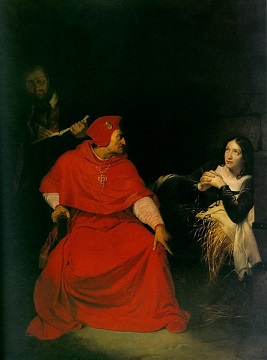 Even in a charade of a trial, participants generally strive to persuade themselves before seeking to persuade others. Humans are corrupt and selfish, to be sure – but most of us still want to be able to sleep at night. We like to win, but we don’t like to feel like horrible people while doing it. We demand a narrative – however twisted or internal – which justifies our treatment of others. We want to feel right.
Even in a charade of a trial, participants generally strive to persuade themselves before seeking to persuade others. Humans are corrupt and selfish, to be sure – but most of us still want to be able to sleep at night. We like to win, but we don’t like to feel like horrible people while doing it. We demand a narrative – however twisted or internal – which justifies our treatment of others. We want to feel right.
Joan was accused of setting herself up as an idol of sorts – a charge the court found themselves unable to prove, even to themselves. She was criticized for how others responded to her, as if she were a miracle-worker or healer – criticisms she shrugged off, for she had little control over how others responded.
Time and again her accusers obsessed over a “fairy tree” in her native Domremy and the possibility that Joan at some point in her childhood danced or sang around it. They focused on a ring her mother gave her with a traditional blessing inscribed on the inside, and any possible indication it operated as a relic or charm. They tried to tie her to known mystics – Brother Richard, Catherine de la Rochelle, and others – although Joan was single-minded to the point of obsession and the last to validate what others wanted or claimed. They particularly hoped to uncover the details of whatever sign she’d given Charles VII upon first meeting him – a secret which remains unknown to us even today, but which persuaded an insecure and uninspired dauphin to suddenly step up and take great risks to secure his crown.
Joan was asked theological questions she had no reason to understand, yet generally managed to circumvent in her responses. She was challenged about the multiple pope problem then facing the Church and any advice she might have given to others regarding its proper resolution – a resolution no one questioning her had offered themselves. Every rumor, every recorded word or phrase, every action of Joan which could be cut’n’pasted into something smacking of corruption were strung together in faux outrage, despite how obvious it was to all involved that whatever Joan may have been, she was hardly vain or ambitious, let alone the willing servant of darkness or corruption.
Right or wrong, she was a humble girl convinced she was obeying the will of God and bewildered why men of the cloth found the idea so horrifying. Joan was even willing to submit to church authority, so long as it not blatantly contradict the revealed will of God as she understood it. In many ways, she anticipated the Protestant Reformation Martin Luther would spark some seventy-five years later.
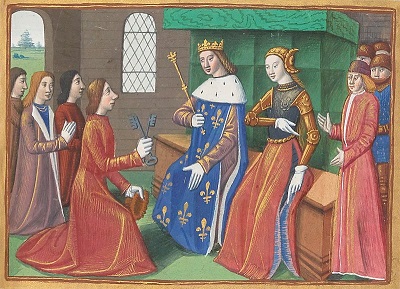 Thus, in the end, there were really only two points on which Cauchon and his cohorts found traction, even by their own standards.
Thus, in the end, there were really only two points on which Cauchon and his cohorts found traction, even by their own standards.
The first were her voices and accompanying visions of St. Catherine, St. Margaret, and St. Michael. Joan was prodded endlessly about these experiences, perhaps in the hope she would ascribe some characteristic or detail to them which seemed to contradict scripture or church teaching. Revelation via angelic visitation may have been unusual, but their own scriptures provided multiple precedents in both Old and New Testaments, making even this loftiest of Joan’s claims difficult to condemn too broadly without seeming petty and vain even for the late medieval church. (“Why would God appear to someone humble and small when he could speak through the rich and powerful and by their own standards blatantly corrupt? Oh, wait…”)
The other issue – and the one for which she was finally and truly condemned – involved her clothes. More than any other single issue, in strict legal terms, Joan was executed for violating society’s dress code.
It had started with her initial journey to see Charles VII. Having somehow persuaded a local official by the name of Robert Baudricourt to legitimize her mission – enough that the King would receive her, at least – Joan sets off with several male cohorts assigned to her protection and logistical guidance. Whether it was primarily to disguise herself from the English and their sympathizers along the way, or to de-sexualize her in the eyes of the many strange men with whom she’d be sharing close quarters, Joan cut her hair short and adapted some form of male military attire.
It was a practical decision. Suspicious eyes weren’t drawn to a small party of male soldiers sharing a campsite, whereas the addition of a young woman would certainly bring attention. Should her party be attacked, armor was of course far better protection than whatever feminine garb would have been considered more appropriate.
Perhaps most significantly, the primary garments of any soldier’s armor were secured to one another by ropes and ties and fasteners. No one wanted some critical piece of protection to fly off in the heat of battle, or slide loose during long rides on horseback, so getting in and out of military accoutrements was a time-intensive task by design. As a 17-year old virgin surrounded by unfamiliar soldier-types far from home, it made absolute sense to protect herself sexually as much as militarily.
It’s important to note that this was a choice entirely allowed by church doctrine. Cross-dressing could be sinful, or even heretical, but it very much depended on circumstances. And Joan, by any reasonable measure, had circumstances.
 Trial transcripts record repeated questioning of Joan concerning her attire. She expressed complete willingness to change into a dress once moved to a church prison, where she’d be guarded by women, as church law required. Her request was, each time, denied. Joan was asked to recite the Lord’s Prayer (something a witch would be unable to do). Again she was compliant, if only she were first given the opportunity for a proper confession. Impossible, unless she changed her outfit! And the cycle began anew.
Trial transcripts record repeated questioning of Joan concerning her attire. She expressed complete willingness to change into a dress once moved to a church prison, where she’d be guarded by women, as church law required. Her request was, each time, denied. Joan was asked to recite the Lord’s Prayer (something a witch would be unable to do). Again she was compliant, if only she were first given the opportunity for a proper confession. Impossible, unless she changed her outfit! And the cycle began anew.
In the end, Bishop Cauchon and company left her with little real choice. They declared victory and the fire was lit.
Joan of Arc has meant a wide variety of things to many different people over the centuries, but it’s this detail that most resonates with me. She prioritized decency and practicality over rules or society’s squeamishness. Joan knew the mores, but she had a larger mission; the tender scruples of others simply weren’t a priority. Thus, in a century of warfare, political strife, economic claims, and divine rights of kings, fought with swords, rituals, and betrayals amidst questions of faith, education, social status, and gender roles, a young girl who heard voices from God and saved a nation with her stubborn faith was executed… for not taking off her pants.
We are welcome to remember Joan for working miracles and overthrowing kingdoms, but these neither saved nor condemned her. Violating the comfort zones of few folks with a little power and an exaggerated sense of self-righteousness, however…
Charles VII remained on the throne and eventually the English were completely expelled from France. Joan was still dead at that point, but would no doubt have been quite pleased.
RELATED POST: Joan of Awkard, Part One: Missing Voices
RELATED POST: Joan of Awkard, Part Two: Hide It Under A Footnote? No! I’m Gonna Let It Shine…
RELATED POST: The Mesopotamians & Jumping the Classroom Shark

 The story of Joan of Arc forces historians to deal with overtly spiritual claims and potentially miraculous outcomes in ways historians do not generally wish to do. We’ll cover the role of religion in the most general ways, if absolutely necessary, but we DON’T LIKE TO TALK ABOUT IT IF WE DON’T HAVE TO.
The story of Joan of Arc forces historians to deal with overtly spiritual claims and potentially miraculous outcomes in ways historians do not generally wish to do. We’ll cover the role of religion in the most general ways, if absolutely necessary, but we DON’T LIKE TO TALK ABOUT IT IF WE DON’T HAVE TO. 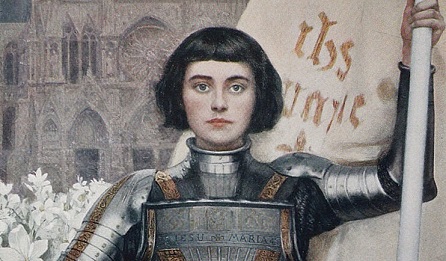 Immutable internal organs or not, how can you tell Joan’s story without pondering her faith? Her voices? She was either crazy with a healthy side of lucky, a very effective liar, or God spoke to her and sent her on a miracle-laden mission to save France from the English. The idea God could like France is problematic enough – but successful wars based on divine visions? Is that something we wish to encourage?
Immutable internal organs or not, how can you tell Joan’s story without pondering her faith? Her voices? She was either crazy with a healthy side of lucky, a very effective liar, or God spoke to her and sent her on a miracle-laden mission to save France from the English. The idea God could like France is problematic enough – but successful wars based on divine visions? Is that something we wish to encourage? If we’re going to acknowledge the hypocrisy and cruelty done in the name of God by early Spanish explorers confronting local Amerindians, let’s recognize the good intentions and legitimate faith of many others in similar situations. If we’re going to explain the cultural destruction done by Anglo-American missionaries to the tribes in their purview, let’s be a bit more vocal about the role of faith driving Samuel Worcester and his nameless ilk who served among the Natives with little reward in this life.
If we’re going to acknowledge the hypocrisy and cruelty done in the name of God by early Spanish explorers confronting local Amerindians, let’s recognize the good intentions and legitimate faith of many others in similar situations. If we’re going to explain the cultural destruction done by Anglo-American missionaries to the tribes in their purview, let’s be a bit more vocal about the role of faith driving Samuel Worcester and his nameless ilk who served among the Natives with little reward in this life.  As we approach modern times, it makes for a rather lopsided view of Presidential paradigms when we discuss foreign policy through every lens but the one most-cited from the Big Podium. “For we must consider that we shall be as a City Upon a Hill…” said John Winthrop in 1630 – a sentiment echoed, reworked, expanded, and cited over and over and over and over by men deciding whether or not we put our best in harm’s way in hopes of spreading that light a little further, or at least holding back the darkness a little longer.
As we approach modern times, it makes for a rather lopsided view of Presidential paradigms when we discuss foreign policy through every lens but the one most-cited from the Big Podium. “For we must consider that we shall be as a City Upon a Hill…” said John Winthrop in 1630 – a sentiment echoed, reworked, expanded, and cited over and over and over and over by men deciding whether or not we put our best in harm’s way in hopes of spreading that light a little further, or at least holding back the darkness a little longer. 

 That’s not actually the stumbling block you might think teaching high school in the 21st century. Nothing locks the minutiae of your subject into permanent recall like explaining it repeatedly throughout the years, and almost anything that doesn’t stick is easily researched when necessary. We’re still trying to get them to bring a pencil and check the class website periodically; there’s little danger they’ll without warning probe such historical depths that I end up academically cowed.
That’s not actually the stumbling block you might think teaching high school in the 21st century. Nothing locks the minutiae of your subject into permanent recall like explaining it repeatedly throughout the years, and almost anything that doesn’t stick is easily researched when necessary. We’re still trying to get them to bring a pencil and check the class website periodically; there’s little danger they’ll without warning probe such historical depths that I end up academically cowed.  Charles’s daddy, Charles VI (nice system, right?) was insane – even for royalty – and may not have been his daddy at all. The dear Queen was thought to be having an affair with the Duke of Orleans, aka the King’s brother, and he may have been Charles VII’s biological father. That would explain in part why the Queen was so cooperative with England when it came time to designate an official heir to the throne; she signed off on Henry VI holding that honor.
Charles’s daddy, Charles VI (nice system, right?) was insane – even for royalty – and may not have been his daddy at all. The dear Queen was thought to be having an affair with the Duke of Orleans, aka the King’s brother, and he may have been Charles VII’s biological father. That would explain in part why the Queen was so cooperative with England when it came time to designate an official heir to the throne; she signed off on Henry VI holding that honor.  It’s also the kind of thing which makes historians crazy, you understand. It’s just so awkward to deal with the supernatural in an academic context, especially given the typical disconnect between those book-learnin’ types and people of faith. We’d rather not talk about it at all.
It’s also the kind of thing which makes historians crazy, you understand. It’s just so awkward to deal with the supernatural in an academic context, especially given the typical disconnect between those book-learnin’ types and people of faith. We’d rather not talk about it at all.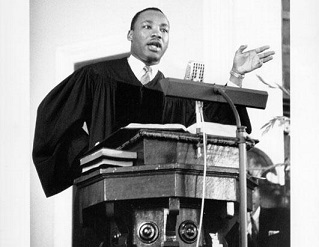 Faith becomes a happy fluke of background rather than a key component – as if King just happened to sit next to someone randomly on the bus who ended up playing some key role we never saw coming, or left his coat too close to the oven and accidentally invented penicillin. As if taking up the call of ministry – of spreading the Word of God to the downtrodden and fighting for justice – made a nice placeholder before changing careers and fighting for civil rights.
Faith becomes a happy fluke of background rather than a key component – as if King just happened to sit next to someone randomly on the bus who ended up playing some key role we never saw coming, or left his coat too close to the oven and accidentally invented penicillin. As if taking up the call of ministry – of spreading the Word of God to the downtrodden and fighting for justice – made a nice placeholder before changing careers and fighting for civil rights.
